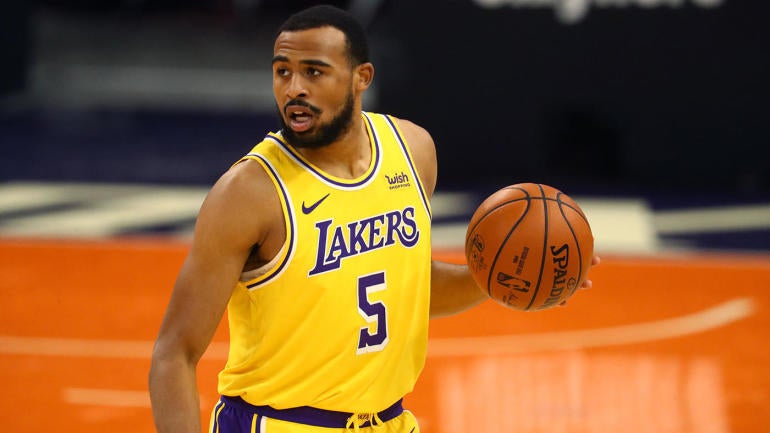
The Los Angeles Lakers are incredibly high on Talen Horton-Tucker's upside. That was ultimately what prevented them from trading for Kyle Lowry at the deadline, and it's going to make Horton-Tucker a wealthy free agent this offseason. In fact, one Eastern Conference executive reportedly told Bleacher Report's Eric Pincus that he would 'max him out' in restricted free agency this offseason.
Of course, Horton-Tucker legally can't get a true max contract, and that is likely what the executive was referring to. Typically, a player with less than six years of NBA experience can receive a contract starting at 25 percent of that season's salary cap. Legally, however, the Lakers cannot offer Horton-Tucker that much. Normally, a team with as many financial commitments as the Lakers would use Bird Rights to go above the salary cap and retain an expensive free agent like him, but full Bird Rights only kick in after three seasons. Horton-Tucker has only been in the NBA for two years, so he only has Early Bird Rights. Given the length of his initial contract, it would have been impossible for the Lakers to get full Bird Rights.
Fortunately for them, the NBA has a mechanism to protect teams in that situation. It's called the Gilbert Arenas provision, and it was invented after Washington signed the eponymous star to an offer sheet that Golden State could not legally match. The rule prevents teams from offering restricted free agents with one or two years of experience more than the non-taxpayer mid-level exception in the first two years of a deal. In simpler terms, that means that no team can legally offer Horton-Tucker more than the Lakers are allowed to pay him.
There's a catch though, and it's one that could come back to bite the Lakers later. Only the first two years of the deal are protected by the Arenas provision. The last two years can pay him anything up to his max. The team signing Horton-Tucker to that deal can average out the cap hits across the four years provided they have the short-term space to do so, but the Lakers, as a team operating above the cap, cannot. If they matched such an offer sheet to Horton-Tucker, they would be paying him max money in the last two years of the deal. In total, the deal would pay Horton-Tucker roughly $83 million over four years, but over $60 million would be paid out in the last two seasons.
In a truly open market, Horton-Tucker might not be able to command that much based on 77 games of tape, but restricted free agency is its own complicated ecosystem. When a player is signed to an offer sheet, that player's team has the right to match it and retain the player. That frequently forces teams interested in swiping those young players to overbid in the hopes that doing so will dissuade that player's team from matching. This is especially true of Arenas-limited free agents because the overall value of the contract, relative to a typical max, is so low. In 2016, for example, the Brooklyn Nets offered Tyler Johnson a backloaded $50 million offer sheet through the Arenas provision. The Miami Heat matched it despite knowing it would cost them almost $40 million in the 2018-19 and 2019-20 seasons combined. The Nets knew that their only chance at stealing Johnson was to overpay for him. The Heat didn't want to lose him for nothing, so they matched. Jeremy Lin and Omer Asik signed similar deals with the Houston Rockets in 2013.
That is why the idea of maxing out Horton-Tucker as that executive suggested isn't as crazy as it might seem. Not only is his max significantly lower than a typical max, but giving him that much might be another team's only hope of prying him away from the Lakers.
"Max" - Google News
July 01, 2021 at 07:14AM
https://ift.tt/3AeY6Sy
Anonymous executive reportedly says he'd 'max out' Talen Horton-Tucker, but that's not as crazy as it sounds - CBS Sports
"Max" - Google News
https://ift.tt/2YlVjXi
Bagikan Berita Ini














0 Response to "Anonymous executive reportedly says he'd 'max out' Talen Horton-Tucker, but that's not as crazy as it sounds - CBS Sports"
Post a Comment